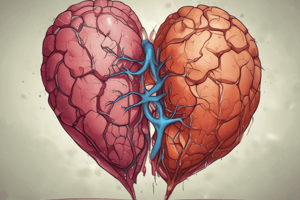Podcast
Questions and Answers
What condition is NOT typically associated with alcoholic liver disease?
What condition is NOT typically associated with alcoholic liver disease?
- Alcoholic fatty liver disease
- Acute hepatitis
- Cirrhosis
- Hemolytic anemia (correct)
Which laboratory finding would most likely suggest non-alcoholic fatty liver disease (NAFLD)?
Which laboratory finding would most likely suggest non-alcoholic fatty liver disease (NAFLD)?
- AST > ALT
- Normal liver function tests
- ALT > AST (correct)
- Increased alkaline phosphatase
What is the classic histopathological finding in alcoholic liver disease?
What is the classic histopathological finding in alcoholic liver disease?
- Mallory bodies (correct)
- Cholestasis
- Necrotizing hepatitis
- Mitochondrial swelling
Which symptom is commonly associated with alcoholic hepatitis?
Which symptom is commonly associated with alcoholic hepatitis?
What is a characteristic risk factor for the progression of NASH to cirrhosis?
What is a characteristic risk factor for the progression of NASH to cirrhosis?
Which of the following is indicative of acute liver failure in the context of viral hepatitis?
Which of the following is indicative of acute liver failure in the context of viral hepatitis?
What is the primary mechanism of liver damage in Budd-Chiari Syndrome?
What is the primary mechanism of liver damage in Budd-Chiari Syndrome?
What is likely to be elevated after heavy alcohol consumption according to laboratory studies?
What is likely to be elevated after heavy alcohol consumption according to laboratory studies?
Which disease commonly arises due to a deficiency of α1-antitrypsin?
Which disease commonly arises due to a deficiency of α1-antitrypsin?
What type of hepatitis is characterized by severe inflammation of the liver without preceding chronic liver disease?
What type of hepatitis is characterized by severe inflammation of the liver without preceding chronic liver disease?
What is the primary cause of Reye's Syndrome in children?
What is the primary cause of Reye's Syndrome in children?
Which of the following is a key characteristic of α1 Anti-trypsin Deficiency?
Which of the following is a key characteristic of α1 Anti-trypsin Deficiency?
What is the most commonly associated bacterium with liver abscesses in the United States?
What is the most commonly associated bacterium with liver abscesses in the United States?
What laboratory finding is typically observed in patients with acute Viral Hepatitis?
What laboratory finding is typically observed in patients with acute Viral Hepatitis?
Which antibodies are most commonly associated with Autoimmune Hepatitis?
Which antibodies are most commonly associated with Autoimmune Hepatitis?
What is the critical consequence of acetaminophen (Tylenol) overdose?
What is the critical consequence of acetaminophen (Tylenol) overdose?
Which of the following is a hallmark of Shock Liver (Ischemic Hepatitis)?
Which of the following is a hallmark of Shock Liver (Ischemic Hepatitis)?
What is the effect of aspirin on the body in relation to Reye's Syndrome?
What is the effect of aspirin on the body in relation to Reye's Syndrome?
What distinguishes liver abscesses caused by Entamoeba histolytica from those caused by bacteria?
What distinguishes liver abscesses caused by Entamoeba histolytica from those caused by bacteria?
Which symptom is atypical for patients suffering from Autoimmune Hepatitis?
Which symptom is atypical for patients suffering from Autoimmune Hepatitis?
Flashcards are hidden until you start studying
Study Notes
Causes of Liver Failure
- Hepatocellular carcinoma: a rare cause of liver failure
- OCP/Pregnancy: can cause liver failure
- Hypercoagulable states: can cause liver failure
- Right Heart Failure: can cause "cardiac cirrhosis" and liver failure
- Reye's Syndrome: a rare cause of liver failure and encephalopathy, often caused by aspirin use in children with viral infections
- α1 Anti-trypsin Deficiency: an inherited disorder that can cause liver cirrhosis and emphysema
- Liver Abscess: a walled-off infection of the liver, often caused by bacteria, Entamoeba histolytica, or Echinococcus
- Viral Hepatitis: caused by Hepatitis A, B, C, D, or E, and characterized by high AST/ALT levels and hyperbilirubinemia
- Autoimmune Hepatitis: an autoimmune inflammation of the liver, often seen in women in their 40s/50s
- Tylenol Overdose: can cause acute liver failure, treated with activated charcoal and N-acetylcysteine
- Shock Liver: ischemic hepatitis caused by hypoperfusion, often seen in ICU patients with shock
Liver Disease
- α1 Anti-trypsin Deficiency: causes lung emphysema and liver cirrhosis due to imbalance between neutrophil elastase and elastase inhibitor AAT
- Liver Abscess: can be caused by Entamoeba histolytica, which forms cysts in contaminated water and can ascend into the biliary tree
- Viral Hepatitis: can cause abnormal synthetic function, leading to hypoglycemia, elevated PT/PTT, and low albumin
- Autoimmune Hepatitis: characterized by anti-nuclear antibodies (ANAs) and anti-smooth muscle antibodies (ASMA)
- Tylenol Overdose: caused by acetaminophen, which forms toxic metabolite NAPQI, treated with N-acetylcysteine to replenish glutathione
Liver Tests
- AST: located in mitochondria, elevated in alcoholic hepatitis
- ALT: located in cytoplasm, elevated in most types of hepatitis
- Alkaline phosphatase (Alk Phos): elevated in cholestasis, also seen in pregnancy, thyroid disease, and bone disease
- Gamma-glutamyl transpeptidase (GGT): similar to Alk Phos, but not elevated in bone disease
- Bilirubin: total, direct, and indirect, elevated in liver disease
- Albumin, PT/PTT, and glucose: tests of synthetic function, abnormal in severe liver disease
Alcoholic Liver Disease
- Three ways alcohol can damage the liver: fatty liver disease, acute hepatitis, and cirrhosis
- Fatty liver disease: accumulation of fatty acids, reversible with cessation of alcohol
- Acute hepatitis: toxic effects from acetaldehyde, characterized by fever, jaundice, and RUQ pain/tenderness
- Cirrhosis: final stage of liver disease, characterized by fibrosis and regenerative nodules
Liver Anatomy
- Liver lobules: functional unit of the liver, consisting of hepatic artery, hepatic vein, and bile duct
- Portal triad: consists of hepatic artery, portal vein, and bile duct
- Liver zones: Zone I (periportal), Zone II (mid zone), and Zone III (centrilobular), with different blood supply and metabolic functions
Studying That Suits You
Use AI to generate personalized quizzes and flashcards to suit your learning preferences.



